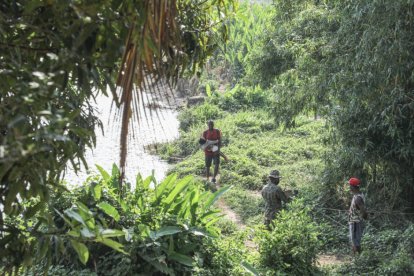At least 55 migrants died in the Darien jungle this year, according to the Panamanian government
Authorities suspect that the numbers may be higher as many bodies cannot be recovered due to the inaccessible terrain or even end up being eaten by animals.

Migrants cross the Darien between Colombia and Panama.
Panama's president, José Raúl Mulino, said Thursday that so far this year 55 migrants have died and 180 children have been abandoned while crossing the inhospitable Darién jungle on their way to the United States.
"Fifty-five people have died in 2024 on the Darien route," on the Colombia-Panama border, Mulino said during his weekly press conference.
This jungle has become a path for migrants from South America trying to reach the United States. Most of them are Venezuelan, although there are also Colombians, Ecuadorians, Haitians and Chinese.
On this journey, the migrants face dangers such as rushing rivers, wild animals and criminal groups that rob, rape and kill them, according to international organizations.
Panamanian authorities suspect that the number of deaths in the jungle may be higher because many bodies cannot be recovered due to the inaccessible terrain or even end up being eaten by animals.
So far this year, 300,000 migrants have crossed the Darien, 41% less than in 2023, when a record 520,000 people made this dangerous journey.
Despite the drop in the number of migrants, Mulino noted that "180 unaccompanied minors" have been abandoned in the Panamanian jungle and are now in the care of childcare institutions.
In some cases, the minors were alone because their families died or were lost in the jungle, but others were traveling alone, according to international agencies.
"It's a very serious problem because as far as I understand they are minors of different ages, from little ones to older ones," Mulino said.
"Surely every unaccompanied minor has family somewhere in Venezuela, Colombia or Ecuador. I don't think they arrived without having anyone to answer to them there in those countries and we should find them," he added.
International agencies have highlighted that upon arrival at border posts in Panama, minors have skin wounds, sprains, insect bites, diseases and are dehydrated.
"We have seen not only that 21% of children and adolescents remain as part of the migratory flow, but we have identified a group that particularly worries us: the unaccompanied," Diana Romero, UNICEF specialist in emergencies in Panama, alerted AFP.
According to Romero, the number of minors traveling unaccompanied by family members went from about 3,000 in the first eleven months of 2023 to 4,476 in the same period of 2024.
RECOMMENDATION





















